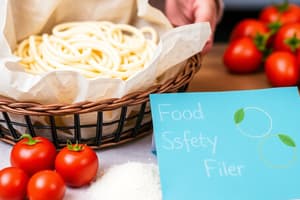Podcast
Questions and Answers
Was umfasst die Lebensmittelkontrolle?
Was umfasst die Lebensmittelkontrolle?
Die Maßnahmen zur Sicherstellung, dass Lebensmittel sicher und gesetzeskonform sind.
Was ist der Zweck der Risikobewertung im Zusammenhang mit Lebensmittelsicherheit?
Was ist der Zweck der Risikobewertung im Zusammenhang mit Lebensmittelsicherheit?
Die Bewertung der Wahrscheinlichkeit und Folgen von Lebensmittelgefahren.
Welche Organisation ist in der EU hauptsächlich für die Lebensmittelkontrolle verantwortlich?
Welche Organisation ist in der EU hauptsächlich für die Lebensmittelkontrolle verantwortlich?
Nationale Behörden in Zusammenarbeit mit der Europäischen Behörde für Lebensmittelsicherheit (EFSA).
Was sind einige der grundlegenden Elemente, die die Integrität und Sicherheit unserer Mahlzeiten gewährleisten?
Was sind einige der grundlegenden Elemente, die die Integrität und Sicherheit unserer Mahlzeiten gewährleisten?
Was ist Rückverfolgbarkeit?
Was ist Rückverfolgbarkeit?
Warum sind Hygienestandards wichtig?
Warum sind Hygienestandards wichtig?
Welche Rolle spielen Zertifizierungen in der Lebensmittelindustrie?
Welche Rolle spielen Zertifizierungen in der Lebensmittelindustrie?
Wie helfen Hygienestandards bei der Verhinderung von Lebensmittelkontamination?
Wie helfen Hygienestandards bei der Verhinderung von Lebensmittelkontamination?
Was sind Zertifizierungen im Zusammenhang mit Lebensmittelsicherheit?
Was sind Zertifizierungen im Zusammenhang mit Lebensmittelsicherheit?
Warum ist Rückverfolgbarkeit ein entscheidender Bestandteil der Lebensmittelsicherheit?
Warum ist Rückverfolgbarkeit ein entscheidender Bestandteil der Lebensmittelsicherheit?
Flashcards are hidden until you start studying
Study Notes
Quality Assurance in Food: A Comprehensive Look at Food Safety Subtopics
Food safety and quality assurance are critical to maintaining a healthy and trustworthy food supply. As such, there are several foundational elements that ensure the integrity and safety of our meals, including Lebensmittelkontrolle (Food Control), Risikobewertung (Risk Assessment), Rückverfolgbarkeit (Traceability), Hygienestandards (Hygiene Standards), and Zertifizierungen (Certifications).
Lebensmittelkontrolle (Food Control)
Food control encompasses the measures taken to ensure that food products are safe and legal for consumption. This involves inspections, monitoring, and testing of food production facilities, as well as the administration of food safety laws and regulations. In the European Union, food control is primarily the responsibility of national authorities, which cooperate with the European Food Safety Authority (EFSA).
Risikobewertung (Risk Assessment)
Risk assessment is the scientific process used to evaluate the likelihood and consequences of food safety hazards. It involves identifying and characterizing hazards, estimating their potential occurrence, and assessing the potential impact on consumer health. Once completed, risk assessments inform risk management decisions, which aim to minimize food safety risks.
Rückverfolgbarkeit (Traceability)
Traceability is the ability to follow the path of a food product through the supply chain, from the farm to the dinner table. It enhances the ability to identify the origin and history of a food product, aiding in the tracking and control of food safety incidents, withdrawals, and recalls. Traceability is a critical component of food safety and quality assurance, allowing regulators and producers to swiftly identify the source of food safety risks.
Hygienestandards (Hygiene Standards)
Hygiene standards are guidelines and practices that ensure the cleanliness and sanitation of food production facilities, equipment, and personnel. They help prevent food contamination and the spread of pathogens that can lead to foodborne illnesses. Hygiene standards are developed and regulated by various national and international organizations, such as the European Union's Hygiene Package and the Food and Agriculture Organization of the United Nations.
Zertifizierungen (Certifications)
Certifications are formal acknowledgments that a food product or production facility meets specific quality and safety standards. They may include food safety management systems, such as Hazard Analysis and Critical Control Points (HACCP), Good Manufacturing Practice (GMP), or International Featured Standards (IFS). Certifications provide assurance to consumers, food producers, and regulators that a product has been produced in a safe and responsible manner, according to widely recognized standards.
In conclusion, ensuring food safety and quality assurance requires a concerted and multifaceted approach. By employing Lebensmittelkontrolle, Risikobewertung, Rückverfolgbarkeit, Hygienestandards, and Zertifizierungen, the food industry can maintain a safe and reliable food supply, fostering consumer confidence and promoting global food security.
Studying That Suits You
Use AI to generate personalized quizzes and flashcards to suit your learning preferences.




